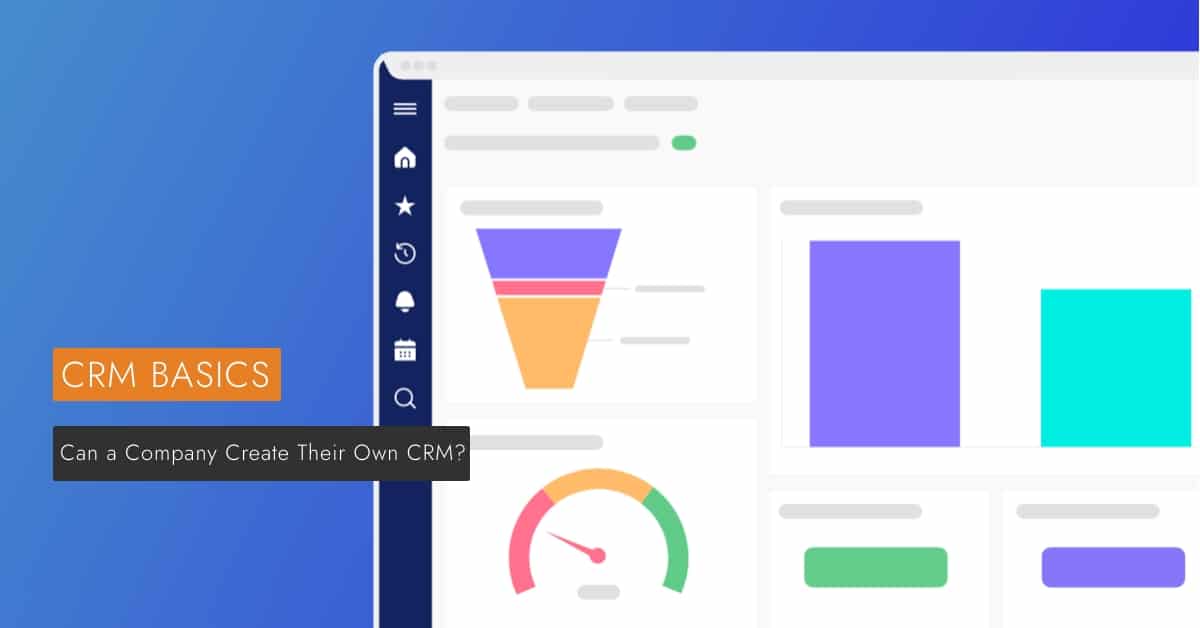Can a Company Create Their Own CRM?

A CRM is a specialized software program designed to help a company manage customer relationships. So it begs the question: can a company create their own customer relationship management (CRM) software?
In our experience, there are plenty of reasons why a company would want to create its own CRM. And in this post, we’ll explain the benefits and drawbacks of creating your own CRM and discuss why we recommend that you try to avoid creating your own CRM in the first place.
So, if you’ve ever wondered how to create your own CRM software, read on.
How Does a CRM Work?
A CRM is a centralized repository that works as an advanced customer base. Though the forerunner of CRMs was an Excel table that could facilitate data entry and supported basic analytics, today’s advanced systems offer top-notch functionalities and have service, marketing, and sales automation rolled into one. It automates communications and supports Artificial Intelligence/Machine Learning algorithms to facilitate sales analytics and streamline the sales process by providing accurate sales forecasts.
A CRM can structure, consolidate and organize each client’s data in a unique holistic profile where a customer’s complete lifecycle – from the first interaction to purchase histories, gets stored chronologically and is readily available to the business staff for delivering proactive service.
A quality CRM is easy-to-use, allows users to be proactive working from ‘any corner’ of the system to make the business run optimally, and drive sales growth by retaining customers and converting leads to deals.
What is a Custom CRM
From enabling to track leads through the sales pipeline to delivering top-notch customer service and scaling your marketing efforts, a CRM, in many ways, helps your business grow. But every business is unique, so are its requirements. And a custom CRM comes into play to meet business specifications better.
A custom or homegrown CRM is a CRM system designed and developed by in-house/third-party software developers from scratch that only includes the CRM functionalities your business requires. So your employees get what they need exactly and do not have to struggle with an off-the-shelf CRM to customize and make it fit into your business process.
Pros of Using a Custom CRM
- Offers Proper Integration with Other System: If you use some ‘peculiar’ software, like customized online call systems, which is way far challenging to integrate with a premade CRM, you may require custom CRM Software.
- Compliance with Your Company Requirements: Of course, the out-of-the-box functionalities of prebuilt CRM solutions can incredibly comply with almost all business models out there. But if your organization has distinct functionalities that make it challenging for your business sales model to fit a conventional B2B sales model, a homegrown CRM can be your choice.
- Improved Workflows: While most ready-to-use CRMs are designed focusing on a particular department of a company, for instance, marketing or sales, with a homegrown CRM, you can decide which department to keep in mind while designing the system. As custom CRMs are seamlessly integrable with the third-party services your business is built around, you can effortlessly transmit data among departments, resulting in improved workflows. But with a turnkey CRM, you may face pitfalls to make the third-party services operate the way your business requires.
Cons of a Custom CRM Software: Why We Don’t Recommend a Custom CRM in the First Place
Fans of customized tools may feel tempted by the DIY route, but keep in mind that there are notable disadvantages that may cost you huge money, time, and even customers – things a business can never afford, right?
Let’s look into why going for a custom CRM is almost a bad idea in the first place:
Expensive
Although it largely depends on your company specifications and needs, creating a CRM from the ground up, whether you hire a developer company or have an in-house IT team, involves a massive upfront investment – around $50,000 for a fully functional system. And guess what? This cost excludes the huge amount of money you have to spend on system maintenance, training your staff to adapt to new software, and more.
On the flip side, what seems to be a mammoth task like changing operating systems or browsers in a custom system can be solved in minutes with a commercial CRM.
And as off-the-peg platforms are tested rigorously, they offer top-notch support service in a package with your maintenance contract, simply because the problems with a widely-used system are easier to handle.
They come with a realm of video tutorials, documentation, and articles to help you get started with the systems quickly. And more impressively, you can contact the expert team or community any time for proactive support in troubleshooting any issue you face, spending nothing.
For instance, Veloxity combines the simplicity of an entry-level CRM with the power of an enterprise-grade one with the subscription fee starting only at $7/user/month.
Customization
Some business owners may think only a custom CRM is the perfect solution to meet their unique business specifications. But they don’t realize that the time it takes to build a homegrown CRM can significantly reduce their sales reps’ productivity.
Luckily a store-bought CRM like Veloxity also offers top-notch customization facilities. It supports sales stages configuration, home pages configuration and comes with drop and drag configurable data views. You can also add custom fields for your CRM contacts, leads, and deals.
Also, today’s most ready-to-use CRMs support integration with almost all systems a company needs to operate optimally.
Software Updates
You must ensure software updates to keep the system running optimally and fix bugs, right? The developer company you have hired to design your CRM may offer free software upgrades and bug fixing for a limited time only. While the cost for hiring experts to get the software updated periodically can alone shudder a business owner, a commercial CRM has expert developers to roll out upgrades regularly, and the best thing is, the cost is included with your subscription fee!
Building a Mobile CRM Needs Expertise
Building a mobile app for your custom CRM is a must to ensure your sales reps can successfully achieve their quotas and be productive even on the go. Developing a native application does not need technical expertise for coding only, but it also involves a lot of money and time.
Luckily, a CRM vendor can help you skip the in-house native application red tapes. For instance, with Veloxity CRM’s fully functional mobile app (compatible with both Android and ios), your team no longer has to grapple with opening their smartphone browsers and picking notes during field visits. It has made sales progress and campaign performance tracking, data visualization, and more both virtually and in-office effortless like never before!
Wrapping Up
Whether you pick a prebuilt CRM or build your own, to get the most out of the system, you must first devise CRM strategies and set the business targets that you want the CRM to help in achieving.
Of course, it’s your call, and even a top-rated CRM may fail to tick all the boxes of your checklist. But it makes sense to go with a premade system having a high capability for tweaking instead of paying out to build a CRM, especially when you have just launched your company and need your CRM to scale with your business cost-efficiently.
